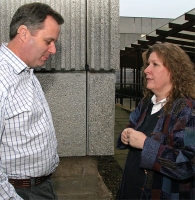Communication Skills course for GPs



This session deals with the interrelationship between consultation models and communication skills. It introduces the Calgary-Cambridge guides as an example of both structure and skills and examines the problem of delineating all the skills. This session was reviewed by Khyati Bakhai and last updated in July 2021.
Learning Objectives
By the end of this session you will be able to:
- discuss the importance of specific communication skills in improving your clinical practice
- identify the interrelationship between models and skills
- explain that communication is outcome-based and that skills enable you to achieve your and your patient's objectives
- describe the Calgary-Cambridge guides as an example of a model that combines both structure and detailed skills
- list the advantages and disadvantages of a skills-based approach to communication learning and discuss the need for experiential learning of communication skills
This session deals with the importance of thinking about individual communication skills in order to improve your clinical practice. It uses the Calgary-Cambridge guides as an example of the close inter-relationship between consultation models and communication skills.

Before commencing this session you should:
- be able to show competence in the core communication skills required for a basic medical interview
Jonathan Silverman has recently retired as Associate Clinical Dean at the School of Clinical Medicine, University of Cambridge and was a general practitioner for over 30 years. He has been actively involved in teaching communication skills since 1988 and in 1993, undertook a sabbatical with Professor Suzanne Kurtz, teaching and researching communication skills at the Faculty of Medicine, University of Calgary.
In 1999 he became Director of Communication Studies for the undergraduate curriculum in Cambridge, which now involves over 700 half day small group sessions per year. He is best known as one of the authors of the Calgary-Cambridge Guides to the Medical Interview, which provide a framework for describing the medical interview and incorporate a comprehensive set of skills referenced to the current evidence.
He has conducted communication skills teaching seminars throughout the UK, in Europe and N. America. In 2005, he founded the UK Council for Communication Skills Teaching in Undergraduate Medical Education for all 33 UK medical school, is past chair of the teaching committee and now President-elect of the European Association of Communication in Healthcare.

- Assessment course for GPs
- Posted By eIntegrity Healthcare e-Learning
- Posted Date: 2025-03-10
- Location:Online
- This session describes the main tools used to assess trainee GPs and distinguishes between formative...
- Self Appraisal course for GPs
- Posted By eIntegrity Healthcare e-Learning
- Posted Date: 2025-03-10
- Location:Online
- This session describes an approach to self-appraisal, and provides practical tips and guidance about...
- Telephone Consultations course for GPs
- Posted By eIntegrity Healthcare e-Learning
- Posted Date: 2025-03-10
- Location:Online
- This session explores the issues that may arise when a consultation is conducted over the telephone,...
- Difficult Consultations course for GPs
- Posted By eIntegrity Healthcare e-Learning
- Posted Date: 2025-03-10
- Location:Online
- This interactive session explores some of the difficulties associated with patients whose behaviour ...
- Balint's Ideas course for GPs
- Posted By eIntegrity Healthcare e-Learning
- Posted Date: 2025-03-10
- Location:Online
- This session introduces Michael Balint, outlines his principal ideas and describes his innovative us...







